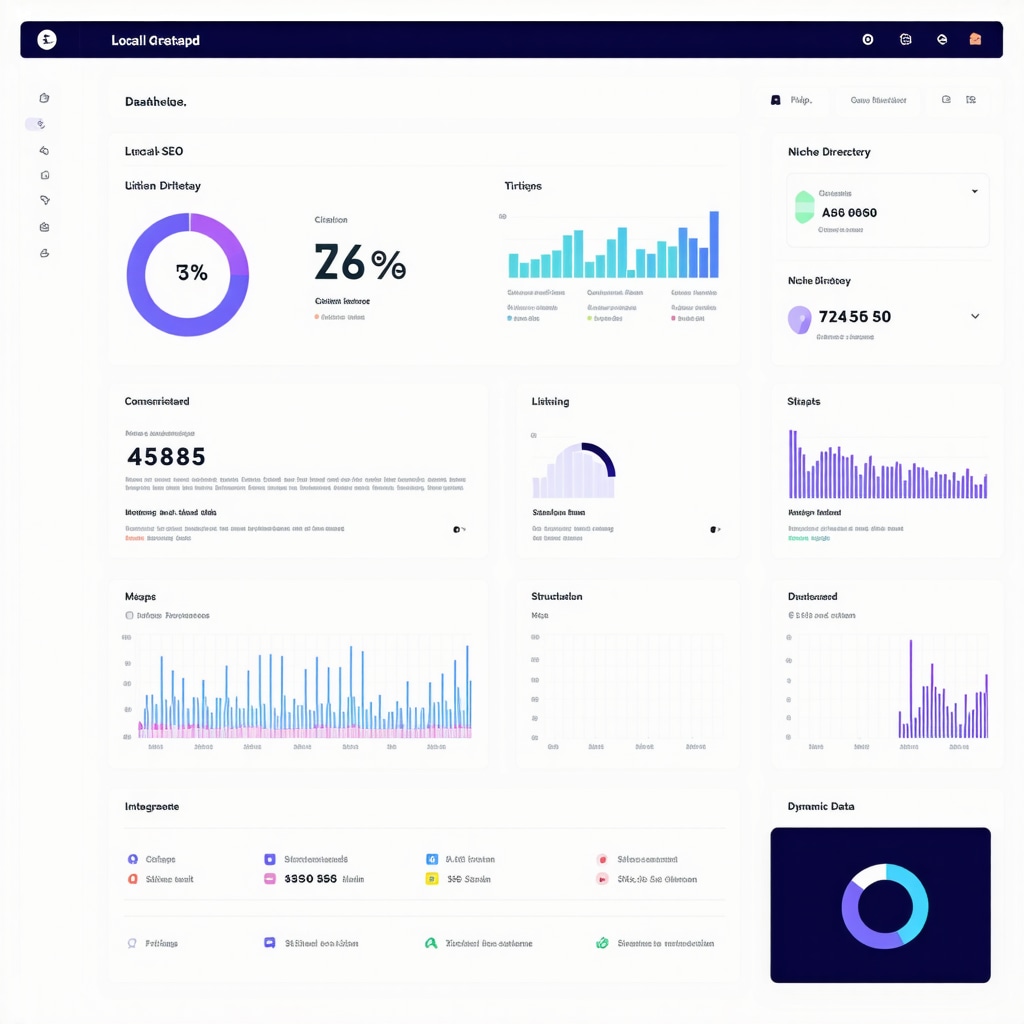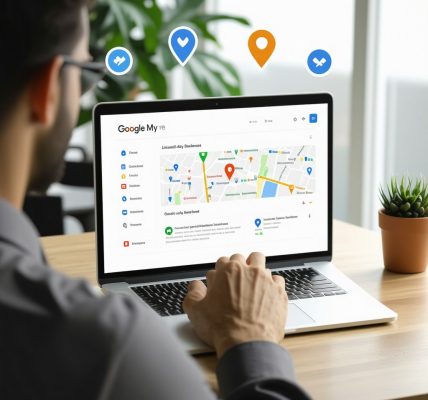Unlocking the Power of GMB Citations: The Unsung Hero of Local SEO
In the competitive landscape of local search optimization, mastering Google My Business (GMB) citation management can be the critical factor that elevates your business above the noise. While many focus heavily on reviews or keyword stuffing, citations—mentions of your business’s name, address, and phone number (NAP) across the web—serve as authoritative signals that Google uses to validate your local presence. When managed strategically, these citations build trust and consistency, directly impacting your local search rankings.
Precision and Consistency: The Citation Management Mantra
Imagine a local bakery appearing inconsistently across directories: “Sweet Treats,” “Sweet Treats Bakery,” and “SweetTreats” with varying addresses. Such discrepancies confuse search engines and erode your ranking potential. Expert citation management insists on meticulous NAP consistency across all platforms—from top-tier directories like Yelp and Bing Places to niche local business listings. This consistency not only enhances your credibility but also fortifies your GMB profile’s authority, making it more likely to rank higher in the Local 3-Pack.
How Do GMB Citations Influence Your Local Search Rankings?
Understanding the nuanced role citations play is paramount. Citations serve as third-party endorsements that affirm your business’s legitimacy and location relevance. Google’s algorithms weigh these signals heavily, especially for “near me” searches where local intent dominates. Moreover, citations contribute to your domain authority and can indirectly boost your backlink profile—a factor known to enhance visibility. However, it’s not just quantity but the quality and relevance of citation sources that matter most in this equation.
Leveraging Advanced Tools and Strategies for Citation Excellence
Managing citations manually can be daunting; this is where specialized tools and services come into play. Platforms such as Moz Local and BrightLocal automate citation monitoring, identify inconsistencies, and streamline updates across hundreds of listings. More advanced tactics involve auditing your existing citations to eliminate duplicate or outdated entries that dilute your SEO impact. Combining these with strategic backlink building around your GMB listing can further elevate your local rankings.
Integrating Citation Management into a Holistic GMB SEO Approach
Citation management should never be siloed. Instead, it complements other GMB optimization techniques like review generation, photo optimization, and keyword-rich business descriptions. For those seeking to deepen their expertise, exploring comprehensive guides such as Effective GMB Citation Management to Boost Local Rankings offers actionable steps aligned with the latest algorithm updates. Together, these strategies create a robust local SEO ecosystem that propels your business to the forefront of Google’s local search results.
Ready to elevate your local visibility? Share your experience with citation management or ask questions below to join the conversation and learn from fellow local SEO experts.
For authoritative insights into local SEO ranking factors, the Moz Local SEO Guide remains an essential resource, offering evidence-based strategies to refine your approach.
Strategic Citation Audits: Unveiling Hidden Opportunities and Risks
While maintaining citation consistency is foundational, conducting periodic citation audits uncovers deeper insights that can profoundly impact your local SEO trajectory. An audit reveals duplicate listings, outdated NAP information, and low-quality citations that may harm rather than help your rankings. For instance, a single incorrect phone number on a prominent directory can mislead customers and dilute your citation authority. Employing tools like GMB SEO Audit services can efficiently pinpoint such discrepancies, allowing you to rectify them swiftly and maintain a pristine citation profile.
How Can You Identify and Prioritize High-Value Citation Sources?
Not all citations carry equal weight. Expert local SEOs assess citation sources by their domain authority, relevance to your industry, and geographic proximity to your business location. Prioritizing citations from authoritative local chambers of commerce, reputable industry directories, and well-trafficked location-specific platforms yields a higher SEO ROI. Furthermore, integrating niche-specific citations enhances topical relevance, signaling to Google that your business is a trusted player within your industry. Resources like the Moz Local SEO Guide provide detailed metrics to evaluate citation quality, ensuring your efforts are strategically focused.
Moreover, leveraging citation building alongside backlink acquisition forms a synergistic approach to local SEO. High-quality backlinks from relevant local websites amplify your GMB listing’s authority, complementing your citation strategy and boosting your visibility in Google’s Local 3-Pack.
Advanced Citation Management: Automation Meets Human Expertise
Automation tools have revolutionized citation management by enabling businesses to monitor hundreds of listings simultaneously. Tools like Moz Local and BrightLocal not only identify inconsistencies but also offer bulk update capabilities. However, automation should be augmented with human oversight to interpret data nuances and prioritize actions based on business goals. For example, while a tool may detect a minor inconsistency, an expert can judge its actual impact on SEO and decide whether immediate correction is necessary.
Integrating citation management into your overall GMB SEO strategy ensures that all signals—from reviews and photos to posts and keywords—work cohesively to enhance local search prominence. This holistic approach maximizes the effectiveness of each SEO component, driving sustained traffic and customer engagement.
Mitigating Citation-Related Challenges in Competitive Markets
Competitive local markets often see aggressive citation tactics, including spammy duplicate listings or false information from competitors. Vigilant citation monitoring helps detect such issues early, preventing potential penalties or customer confusion. Establishing alerts for sudden changes in key citation platforms is a best practice among local SEO professionals. Additionally, engaging with citation providers to correct inaccuracies demonstrates proactive management and reinforces your business’s trustworthiness.
To delve deeper into citation management complexities and advanced tactics, explore our comprehensive resource Effective GMB Citation Management to Boost Local Rankings.
What Role Does Citation Management Play in Future-Proofing Your Local SEO?
As Google continually refines its algorithms to prioritize user experience and relevance, citation management remains a critical pillar for local SEO resilience. Consistent, authoritative citations create a stable foundation that supports emerging ranking factors such as behavioral signals and hyperlocal intent. Moreover, with the rise of voice search and AI-driven queries, accurate NAP data across platforms ensures your business remains discoverable in evolving search contexts. Staying ahead requires ongoing citation vigilance complemented by adaptive strategies that align with Google’s evolving preferences.
Industry experts from Moz emphasize that citation health is a dynamic asset, not a set-it-and-forget-it task. Regularly revisiting your citation strategy and integrating it seamlessly with other GMB optimizations will secure your local SEO success well into the future.
Have you encountered unique challenges or breakthroughs in managing your GMB citations? Share your insights or questions below to contribute to this expert dialogue. For more nuanced strategies, consider our detailed guides on optimizing your Google Business listing and GMB review generation best practices.
Harnessing the Power of Niche-Specific Citation Networks for Laser-Focused Local SEO
While broad citation platforms build foundational authority, expert local SEOs recognize the untapped potential within niche-specific citation networks. These specialized directories and platforms cater to distinct industries or micro-geographies, granting a hyper-targeted relevance boost that general directories cannot replicate. For example, a boutique law firm might pursue listings in legal-specific directories like Avvo or Justia, while a local organic grocery would benefit immensely from citations on sustainable business directories and community-focused portals.
These niche citations serve as powerful topical signals, informing Google’s algorithms that your business is not only locally relevant but also a subject matter authority within its domain. Leveraging them requires a strategic approach: auditing your industry landscape to identify high-authority niche directories, ensuring NAP consistency, and periodically updating your profiles with fresh content or offers to maintain engagement.
What Are the Best Practices for Integrating Niche Citations Without Diluting Your SEO Impact?
Incorporating niche citations demands a balance—overextending into low-quality or irrelevant directories can dilute your SEO efforts and even trigger algorithmic penalties. The best practice involves:
- Evaluating domain authority: Tools like Ahrefs or SEMrush provide metrics to assess the quality of citation sources.
- Assessing topical relevance: Ensure the directory aligns tightly with your business’s sector.
- Checking geographic alignment: Prioritize citations that emphasize your local area or service region.
- Maintaining citation uniformity: Use automation tools combined with manual verification to keep all listings synchronized.
This meticulous selection process ensures that each citation adds value rather than noise. According to Search Engine Land’s 2023 Local Ranking Factors Study, citation quality and relevance continue to weigh heavily in Google’s local pack algorithm, underscoring the importance of strategic niche citation building.
Leveraging Structured Data Markup to Amplify Citation Signals and GMB Performance
Beyond traditional citation management, integrating structured data markup (Schema.org) on your website offers an advanced layer of SEO sophistication. By embedding LocalBusiness schema with accurate NAP information, opening hours, geo-coordinates, and service details, you provide search engines with machine-readable signals that corroborate your GMB citations. This semantic clarity enhances Google’s confidence in your business data consistency, often resulting in enriched search results like knowledge panels and local packs.
Implementing structured data requires technical precision: improper markup can confuse crawlers or even lead to penalties. Therefore, expert SEOs leverage tools such as Google’s Structured Data Testing Tool to validate code before deployment. Additionally, keeping markup updated with changes to your business information ensures persistent alignment across all digital touchpoints.
Proactive Citation Monitoring: Employing AI and Machine Learning for Real-Time Accuracy
Emerging technologies in AI and machine learning are revolutionizing citation management by enabling real-time monitoring and predictive analytics. Advanced platforms now analyze citation patterns, flagging anomalies—such as unexpected NAP changes or suspicious new listings—that could undermine your local SEO health. These systems can prioritize issues based on their potential impact, allowing SEO teams to triage and address problems efficiently.
Such proactive monitoring is critical in hyper-competitive sectors where citation sabotage or inadvertent errors by third parties are common. Integrating AI-driven tools with human expertise creates a hybrid approach that maximizes accuracy and responsiveness, safeguarding your GMB listing’s integrity.
How Do AI-Driven Citation Tools Enhance Traditional Local SEO Workflows?
AI-enhanced citation tools offer several benefits over manual or semi-automated processes:
- Scalability: Manage thousands of listings simultaneously without human error.
- Predictive insights: Anticipate citation issues before they impact rankings.
- Automated correction suggestions: Propose fixes based on historical data and best practices.
- Sentiment analysis integration: Correlate citation changes with review trends to assess reputation impact.
This sophisticated approach empowers businesses to maintain a competitive edge, ensuring citation ecosystems remain a strong pillar in their local SEO architecture.
Ready to transform your citation strategy with cutting-edge methods? Dive deeper into AI-powered local SEO solutions and explore tailored techniques for your industry in our upcoming expert series.
Decoding the Synergy Between AI and Citation Management in Local SEO
As the digital landscape evolves, integrating artificial intelligence with citation management elevates local SEO strategies beyond conventional boundaries. AI-powered platforms now harness machine learning algorithms to detect subtle citation inconsistencies, predict potential ranking disruptions, and provide actionable insights with unprecedented accuracy. This paradigm shift enables SEO professionals to preemptively address citation issues, optimize listing quality, and maintain agility in response to Google’s algorithmic changes.
How Can AI-Powered Citation Tools Revolutionize Your Local SEO Workflow?
AI-driven citation tools offer multifaceted advantages that transcend manual efforts. They provide scalable oversight by continuously monitoring thousands of citations across diverse platforms, leveraging predictive analytics to forecast citation risks before they impact visibility. Additionally, automated correction suggestions, grounded in extensive historical data, enable precise remediation of NAP discrepancies. The integration of sentiment analysis further allows correlation of citation health with customer review trends, offering a holistic view of reputation management. This synergy between AI and human expertise enhances decision-making, ensuring citation data remains pristine and strategically aligned.
Elevating Citation Signals with Schema Markup: A Technical SEO Imperative
Embedding structured data markup such as LocalBusiness schema on your website transforms how search engines comprehend your business information. By encapsulating accurate NAP data, operating hours, service types, and geocoordinates within machine-readable code, you reinforce the consistency of your GMB citations. Proper schema implementation not only supports enhanced search features like rich snippets and knowledge panels but also fortifies your local SEO foundation against data fragmentation.
However, the technical precision required demands thorough validation. Utilizing tools like Google’s Structured Data Testing Tool is essential to avoid misconfigurations that can undermine your SEO efforts. Regular audits and updates to markup ensure alignment with evolving business details and search engine requirements, maintaining trustworthiness and maximizing visibility.
Unlocking the Potential of Niche-Specific Citation Ecosystems for Targeted Authority
Beyond broad directories, niche-specific citation networks provide hyper-relevant endorsement signals that significantly enhance topical authority within specialized markets. For instance, healthcare providers benefit from listings on medical directories like Healthgrades, while local artisans thrive through community-focused platforms. These citations deliver tailored geographic and industry relevance, directly influencing Google’s perception of your business’s expertise and local prominence.
Strategic integration involves meticulous evaluation of citation sources based on domain authority, topical relevance, and geographic specificity. Maintaining uniform NAP information and periodic content updates on these niche platforms fosters trust and user engagement, amplifying your local SEO impact.
According to Search Engine Land’s 2023 Local Ranking Factors Study, the quality and contextual relevance of citations remain paramount in local ranking algorithms, underscoring the necessity of such focused citation strategies.

Proactive Citation Audits: The Cornerstone of Sustained Local SEO Excellence
Regularly conducted citation audits are indispensable for identifying hidden risks such as duplicate listings, outdated NAP data, or malicious competitor actions. Employing a hybrid approach—leveraging AI-driven tools alongside expert human analysis—ensures nuanced understanding and prioritization of corrections that yield the highest SEO dividends. This vigilance safeguards your GMB profile against data fragmentation, boosts user trust, and maintains competitive advantage in saturated markets.
Industry leaders advocate integrating citation audits with broader GMB optimizations, including review management and content freshness, to construct a resilient local SEO ecosystem. For ongoing mastery, exploring comprehensive resources such as the Effective GMB Citation Management to Boost Local Rankings guide equips professionals with cutting-edge tactics aligned with the latest algorithmic shifts.
Ready to harness these advanced citation management techniques and future-proof your local SEO strategy? Engage with our expert community by sharing your experiences or posing your questions below.
Frequently Asked Questions (FAQ)
What exactly are GMB citations and why do they matter for local SEO?
GMB citations are online mentions of your business’s Name, Address, and Phone number (NAP) across various platforms. They serve as authoritative signals to Google confirming your business’s legitimacy and local presence. Accurate and consistent citations boost your local search rankings by enhancing trustworthiness and relevance in Google’s algorithm.
How can inconsistent citations negatively impact my Google My Business ranking?
Inconsistent citations create confusion for search engines, leading to diminished trust and lower local rankings. Variations in your business name, address, or phone number across listings fragment your online identity, making it harder for Google to verify your business authority and potentially causing your listing to rank lower or appear less prominently.
Are all citation sources equally valuable for boosting local SEO?
No, citation quality varies. High-authority, industry-relevant, and geographically aligned directories offer stronger SEO benefits than generic or low-quality sources. Prioritizing niche-specific platforms, reputable local chambers of commerce, and well-trafficked directories maximizes citation impact and local relevance.
How do AI and automation tools improve citation management?
AI-driven tools enable real-time citation monitoring across hundreds or thousands of listings, quickly identifying inconsistencies or suspicious changes. They provide predictive insights and automated correction suggestions, reducing manual workload while maintaining citation accuracy. However, human expertise remains essential to interpret data nuances and prioritize fixes effectively.
Can implementing structured data markup enhance my GMB citation signals?
Yes. Embedding LocalBusiness schema markup on your website with accurate NAP and business details supplies search engines with machine-readable data, reinforcing citation consistency. This semantic clarity can lead to enhanced search features like rich snippets and knowledge panels, improving your local SEO visibility.
How often should I conduct citation audits?
Regular citation audits—quarterly or biannually—are recommended to detect and fix duplicate listings, outdated information, or competitor-induced inaccuracies. Ongoing audits maintain a pristine citation profile, safeguarding your local SEO performance and customer trust.
What role do niche-specific citation networks play in local SEO strategy?
Niche-specific citations provide hyper-relevant endorsement signals that boost your topical authority within your industry or micro-geography. These targeted listings enhance Google’s perception of your business expertise and local prominence, offering advantages over broad, general directories.
How can I prevent citation sabotage or spam in competitive markets?
Proactive citation monitoring with alerts helps identify fraudulent or spammy listings early. Engaging with citation providers to correct inaccuracies and maintaining vigilant oversight protects your business reputation and preserves your local search rankings against malicious competitor tactics.
Is citation management a one-time task or an ongoing process?
Citation management is an ongoing, dynamic process. Google’s algorithms and local search landscape continuously evolve, requiring persistent vigilance, regular updates, and integration with broader GMB optimization efforts to maintain and improve local SEO success.
How does citation management integrate with other GMB SEO components?
Citation management complements review generation, photo optimization, keyword-rich business descriptions, and structured data markup. Together, these elements form a cohesive local SEO ecosystem that enhances your GMB listing’s authority, relevance, and visibility in local search results.
Trusted External Sources
- Moz Local SEO Guide – This comprehensive resource offers evidence-based strategies on citation management, local ranking factors, and GMB optimization, serving as a trusted foundation for local SEO best practices.
- Search Engine Land’s 2023 Local Ranking Factors Study – Provides up-to-date research on the importance of citation quality, relevance, and emerging local SEO trends, informing strategic citation building approaches.
- Google’s Structured Data Testing Tool – An essential technical resource for validating LocalBusiness schema markup implementation to ensure semantic accuracy and prevent SEO penalties.
- BrightLocal and Moz Local Platforms – Leading citation management tools that automate monitoring, auditing, and bulk updating of listings, critical for scalable and precise citation maintenance.
- RankingSEOGMB Expert Guides – Specialized articles and tutorials on GMB citation management and SEO audits tailored to advanced local SEO practitioners seeking actionable, algorithm-aligned tactics.
Conclusion
Mastering Google My Business citation management is an indispensable pillar of successful local SEO. Through precise NAP consistency, strategic selection of high-value citation sources—including niche-specific networks—and the integration of advanced tools such as AI-driven monitoring and structured data markup, businesses can significantly enhance their local search presence. Regular citation audits and proactive vigilance safeguard against data fragmentation and competitive sabotage, ensuring sustained visibility in Google’s Local 3-Pack.
Integrating citation management seamlessly with complementary GMB optimization techniques creates a robust, adaptive local SEO ecosystem that responds effectively to evolving algorithms and user behaviors. By embracing these expert strategies, businesses not only elevate their local authority but also future-proof their digital footprint in an increasingly competitive landscape.
Engage with this community by sharing your citation management experiences or questions below, and explore related expert content to deepen your local SEO mastery.




